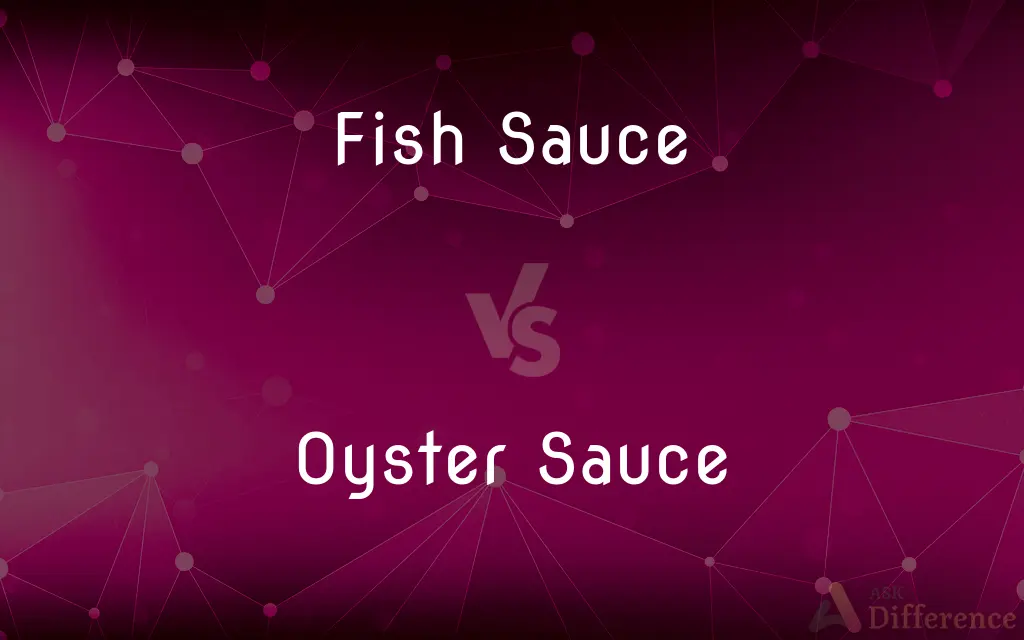Fish Sauce vs. Oyster Sauce — What's the Difference?
By Maham Liaqat & Fiza Rafique — Published on February 24, 2024
Fish sauce is a salty, umami-rich condiment made from fermented fish, ideal for seasoning and marinades. Oyster sauce, thicker and sweeter, is derived from oysters and used for stir-fries and glazing.

Difference Between Fish Sauce and Oyster Sauce
Table of Contents
ADVERTISEMENT
Key Differences
Fish sauce and oyster sauce are staple condiments in Asian cuisine, each bringing unique flavors and uses to the table. Fish sauce, produced through fermenting fish with salt, is known for its intense saltiness and deep umami flavor. Oyster sauce, made from oysters' sugar, salt, and water simmered until caramelized and thickened, offers a complex flavor profile that is sweet, salty, and slightly earthy, often used in Chinese cooking to enhance stir-fries, noodles, and as a glaze for meat and vegetables.
The primary distinction lies in their consistency and flavor profile. Fish sauce is thin and watery with a potent fishy aroma, whereas oyster sauce is dark, thick, and less intense, with a balance of sweetness and umami without a strong fish flavor. This difference in texture and taste makes fish sauce more suited for adding a savory depth to dishes without altering their consistency, while oyster sauce is ideal for creating rich, glossy finishes and adding body to sauces and gravies.
In terms of ingredients, fish sauce is simpler, primarily containing fermented fish and salt. Oyster sauce, on the other hand, often includes a variety of additional ingredients such as sugar, cornstarch, and sometimes soy sauce, contributing to its complex flavor and thicker texture.
Both sauces are used to enhance the umami quality of dishes, they serve different culinary purposes and are not typically used interchangeably. Whereas fish sauce is often added during the cooking process or mixed into sauces to infuse dishes with flavor, while oyster sauce is frequently used as a finishing sauce, providing a burst of flavor and a visually appealing sheen to dishes.
Choosing between fish sauce and oyster sauce depends on the desired flavor outcome and dish being prepared. For a pure, salty umami kick, fish sauce is the go-to, while for a sweeter, more nuanced flavor and thicker texture, oyster sauce is preferred. Both sauces are integral to achieving the authentic taste of many Asian dishes and can elevate the flavor profile of a wide range of recipes.
ADVERTISEMENT
Comparison Chart
Base Ingredient
Fermented fish
Oysters
Flavor Profile
Salty, umami, fishy
Sweet, salty, umami, slightly earthy
Consistency
Thin and watery
Thick and viscous
Primary Use
Seasoning, marinades, dipping sauces
Stir-fries, glazing, noodle dishes
Additional Ingredients
Salt (primarily)
Sugar, salt, water, cornstarch, sometimes soy sauce
Compare with Definitions
Fish Sauce
A salty, fermented fish condiment, essential in Southeast Asian cuisine.
He added a splash of fish sauce to the soup for an umami boost.
Oyster Sauce
Its viscous texture makes it ideal for thickening and adding body to dishes.
She thickened the gravy with oyster sauce for added flavor.
Fish Sauce
Fish sauce is used to season dishes, in marinades, and as a base for sauces.
A few drops of fish sauce can transform a bland dish.
Oyster Sauce
A thick, sweet, and savory sauce made from caramelized oyster juices.
He glazed the stir-fry vegetables with oyster sauce for a glossy finish.
Fish Sauce
Its salty and pungent taste enhances the overall flavor profile of dishes.
Fish sauce brought the salad dressing to life with its savory depth.
Oyster Sauce
Offers a complex balance of sweetness, saltiness, and umami.
The secret to his signature sauce is a generous spoonful of oyster sauce.
Fish Sauce
Characterized by its thin, watery consistency and strong aroma.
Despite its strong smell, fish sauce is a staple in her kitchen.
Oyster Sauce
Essential in Chinese cuisine, used for stir-fries and as a glaze.
Oyster sauce added a rich flavor to the beef stir-fry.
Fish Sauce
Known for its intense umami flavor and versatility in cooking.
Fish sauce is key to the marinade's depth of flavor.
Oyster Sauce
Contains additional ingredients like sugar and cornstarch, enhancing its sweet and earthy taste.
Oyster sauce's unique taste comes from its blend of sweet and savory elements.
Common Curiosities
What dishes are best suited for fish sauce?
Fish sauce is ideal for seasoning, marinades, and dipping sauces in Southeast Asian cuisine.
Is fish sauce stronger than oyster sauce?
Fish sauce has a stronger, saltier flavor and fishy aroma compared to the sweeter, more balanced taste of oyster sauce.
What is the shelf life of fish sauce and oyster sauce?
When stored properly, fish sauce can last for 2-3 years, and oyster sauce for up to 18 months to 2 years.
Can vegetarians use oyster sauce?
Traditional oyster sauce contains oysters, but vegetarian versions made from mushrooms are available.
Can fish sauce and oyster sauce be used interchangeably?
Due to their different flavor profiles and consistencies, they are not typically used interchangeably.
What dishes are best suited for oyster sauce?
Oyster sauce is best used in Chinese cooking for stir-fries, noodle dishes, and as a glaze for meats and vegetables.
How should fish sauce and ooyster sauce be stored after opening?
Both should be stored in the refrigerator after opening to maintain freshness and extend shelf life.
Can I make a substitute for fish sauce or oyster sauce at home?
Yes, soy sauce mixed with a little sugar can substitute for oyster sauce, and for fish sauce, soy sauce or tamari with a dash of Worcestershire sauce can be used.
How do I choose a quality fish sauce or oyster sauce?
Look for brands with minimal additives, and for fish sauce, a darker color and the presence of sediment can indicate a longer fermentation period and richer flavor.
Can people with shellfish allergies use oyster sauce?
People with shellfish allergies should avoid traditional oyster sauce, but they can use mushroom-based vegetarian oyster sauces as an alternative.
What are the nutritional benefits of fish sauce and oyster sauce?
Both provide umami flavor without adding fat or calories, but they should be consumed in moderation due to their high sodium content. Fish sauce also contains some minerals like iodine and phosphorus.
Are there any health concerns associated with consuming fish sauce or oyster sauce?
Both contain high levels of sodium, so they should be used in moderation, especially by those monitoring their salt intake.
How do fish sauce and oyster sauce impact the overall taste of a dish?
Fish sauce adds a salty, umami depth without changing the dish's texture, while oyster sauce adds a sweet and savory flavor and can thicken and add gloss to dishes.
Can fish sauce or oyster sauce be used in vegetarian or vegan recipes?
Oyster sauce typically is not vegetarian or vegan, but vegetarian versions are available. Fish sauce is not vegetarian, but there are vegan fish sauce alternatives made from seaweed or soy.
Are there any dishes where both fish sauce and oyster sauce are used together?
Yes, in some Asian recipes, both sauces are used to balance flavors, providing both depth and a complex flavor profile.
Share Your Discovery

Previous Comparison
Nascent Iodine vs. Lugol’s Iodine
Next Comparison
Sulphuric Acid vs. Sulphurous AcidAuthor Spotlight
Written by
Maham LiaqatCo-written by
Fiza RafiqueFiza Rafique is a skilled content writer at AskDifference.com, where she meticulously refines and enhances written pieces. Drawing from her vast editorial expertise, Fiza ensures clarity, accuracy, and precision in every article. Passionate about language, she continually seeks to elevate the quality of content for readers worldwide.
















































